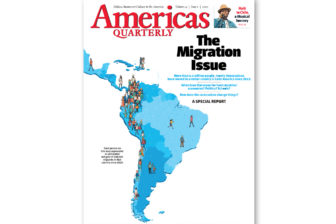This article is adapted from AQ’s special report on migration
RIO DE JANEIRO—When Yilmary de Perdomo first arrived in Brazil in 2016, fleeing her native Venezuela, she found many doors closed.
Banks wouldn’t let her open a checking account. A landlady refused to rent her an apartment. When she finally found a job at a school, it was as an assistant, despite her being a trained occupational therapist with a solid career back home.
Being granted the right to live and work in Brazil, Perdomo quickly discovered, just wasn’t enough to pave the way to the new life she aimed to build. “The government alone can’t give jobs to all immigrants,” she said.
At a time of unprecedented migration in Latin America, it will be up to the private sector to take many steps to integrate new arrivals. Companies can’t do everything themselves, of course; governments must still provide work permits, licenses and other services. But ultimately, there are several things large and small businesses can do to harness the skills and buying power of migrants — and it is in their interest to do so.
“Immigrants need economic inclusion, and that’s only possible if the private sector acts,” said Jonathan Berezovsky, founder of Migraflix, a São Paulo-based nonprofit that helps integrate immigrants by promoting entrepreneurship and access to markets. “In countries such as Brazil, where government resources aren’t abundant, it’s even more important for the private sector to embrace this role.”
One example of what businesses can do came last September, when the Inter-American Development Bank and charity Tent Partnership for Refugees struck a deal with 22 companies to commit to creating thousands of jobs for migrants, integrating refugee-owned businesses in supply chains, and providing new arrivals with services.
Such efforts work best when combined with government action. Colombia and Mexico have recently rolled out tax incentives for companies to invest in border areas as part of their efforts to include migrants in the formal economy. Mexican President Andrés Manuel López Obrador called his plan a “development curtain” that could stop both Mexicans and other migrants from moving on to the United States.
A Nudge for Action
Oscar Romero, vice president of Bancamía, a Colombian microfinance bank, said they have so far achieved 15% of their commitment of providing banking services to 200 Venezuelan entrepreneurs by the end of 2020. The main challenge, he said, is the lack of information about immigrants and their credit history. But Bancamía wants to convince other banks that Venezuelan refugees can make good on their debts, even if they can’t provide the usual documentation.
“It’s a process of generating trust,” Romero said.
Bancamía is also building a partnership with chambers of commerce across Colombia to train migrants opening their own businesses, with the possibility of then having access to credit to start out.
According to Tent, only half of Venezuelans living in Peru and Colombia had formal employment. In the state of São Paulo, in Brazil, Federal Police data from 2015 (the most recent available) shows a similar scenario: 55% of women migrants were unemployed, versus 38% of men.
And that is true for migrants with university degrees and professional experience as well, said Ileana Cruz, head of Latin America partnerships at Tent.
“That can be really challenging and frustrating for engineers and lawyers that are now having to work jobs in completely different fields,” she said. “But I think at the same time this also presents an opportunity for the business community.”
Many of these workers offer a potential solution to Latin America’s skills gap — there is a shortfall of at least 450,000 professionals in the technology sector, according to an estimate in September by IDC, a consultancy.
That reality is what sparked Marcela Torres to start HolaCode, a startup that teaches software development skills to migrants in Mexico.
It all started when she noticed a lack of quality opportunities for migrants in Mexico, including many who had returned from the United States with valuable skills.
“A lot of these people ended up working in call centers, which is a waste of talent,” she said.
Torres said she wants the business community to see that migrants aren’t simply victims of the horrors they went through to get to their host country. The tendency to over-victimize people, she said, “limits their opportunities.”
Berezovsky, from Migraflix, said the feedback he receives from partner companies is overwhelmingly positive. Immigrants refresh the work environment, bringing new ideas and experiences. And they tend to value the opportunities they get, reducing turnover.
The list of doors Perdomo, from Venezuela, knocked on and courses she took to get where she is now is a demonstration of this resilience.
She took culinary courses at Migraflix, which also connected her to clients, and reinvented herself as the owner of a catering service, Tentaciones de Venezuela.
“I didn’t stand still, darling!” Perdomo said. “I’m a foreigner, so I always have to be better.”
—
Andreoni is a freelance journalist based in Rio de Janeiro








